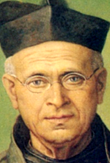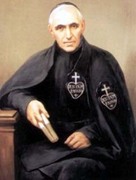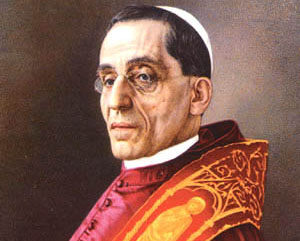THE Church has carefully weighed the evidence in favour of Gabriel’s heroic virtue, and minutely examined the miracles that testify to it. She has now added her testimony to that of others. In 1896 she bestowed upon Gabriel the title of “Venerable.” On the thirty-first of May, 1908, she went a step further by publicly announcing his beatification and giving him the title of “Blessed.” The London Tablet in its account of that impressive ceremony said:

Fr. Norbert
“The last of the three beatifications fixed for the Jubilee year of Pius X was held today in St. Peter’s. They have brought us very near the saints . Rarely, if ever, in the history of beatifications did heaven and earth seem brought so close to each other as this morn when the curtain fell and the figure of Blessed Gabriel of the Virgin of Sorrow shone out amid the radiance of innumerable lamps above the chair of St. Peter. He looks down upon those to whom he owed obedience, respect, and love on earth, whose hands he had clasped but a few years ago. There was his elder brother, Dr. Michael Possenti, still in the flesh, still vigorous and active in the medical profession at the age of seventy-three. As he looks now from the raised tribunal near the altar at the picture of his younger brother amid a band of angels, recollections of their boyhood in their old home mingle with the deep Catholic spirit of veneration and humble prayer, that unites the vast multitude gathered about the tomb of the Apostles to hear the word of Christ’s Vicar proclaiming a new hero and intercessor in the Church of God. The doctor’s daughter, a niece of Blessed Gabriel, is with him. An old school companion of Gabriel’s is now a prosperous tradesman in Rome. Needless to say, he was also present this morning. Another human touch to this wonderful scene. Among the crowd of worshippers is the lady whom the parents of Gabriel, in their earthly plans for his welfare, destined him to marry. She is now the wife of an Italian colonel. There is also present a person whose miraculous cure has served for the process of beatification.Above all, Father Norbert, is here. What a joyous day is this for him, the Novice- Master, the teacher and spiritual director of Gabriel! He is now seventy-nine years old, and he comes to see his former penitent, who used to come to him for absolution and advice, exalted to the honours of the altar. It was Father Norbert who assisted Blessed Gabriel on his death bed, and witnessed every stage of that perfect closing of his life.”
BEFORE those who are beatified can be canonized and called saints, it must be proved that at least two more first-class miracles have been performed by their intercession after the date of their beatification. This condition was soon fulfilled in the case of Blessed Gabriel. Almost daily we hear and read accounts of miracles wrought for those who appeal to him for intercession with God.
Benedict XV
“The decree which approves the two miracles attributed to the intercession of Blessed Gabriel is a new stimulus from on high urging us to more effectually imitate the virtues of this dear son of Umbria, to whom, as a new Gonzaga, can be applied the words of Holy Scripture, being made perfect in a short space, he fulfilled a long time. The short space of time from the day of his beatification to the two wonders attributed to this young Passionist is clear proof of heavenly designs. This will appear in a clearer light to anyone who considers that the publication of the decree in relation to Venerable Plunket, and the reading of the decree in regard to Blessed Gabriel teach one lesson, namely, that the perfection of a Christian depends upon the diligence and constancy with which he discharges the duties of his state. And this rule of conduct should not appear to anyone too vague because general, nor too simple because easy. Its true worth lies in the fact, that it embraces all conditions in which a Christian may be placed, and no one can reject it as being too difficult for the ordinary man.”
These words of the highest authority on earth remind us that saints are raised up by God not merely to intercede with Him and obtain miracles for us, but especially to be models of virtue for our imitation. This truth is often forgotten by those who make no effort to walk in the footsteps of the saints and imitate their virtues, and who seem to think that a saint is of no use unless he works miracles for them. It was not the virtues that appeal to the world, the virtues of a public, popular life, that raised Gabriel to the heights of sanctity; but the virtues of the hidden, interior, spiritual life, the virtues practiced by Christ in the humble home of Nazareth. These virtues a whole-hearted love for God, a fervent practice of religion, purity of intention, humility, obedience, poverty, chastity, self-denial, penance, prayer, fraternal charity, and a constant remembrance of the Presence of God in union with Jesus and Mary may be practised in every state of life. They sanctify the servant as, well as the master. They are more easily acquired and practised by the poor than by the rich. They make saints of laymen as well as of monks and priests. A writer, already quoted, commenting on the beatification of Saint Gabriel said:
“The Church has judged Blessed Gabriel by the same criterion she has applied in the case of those saints whose works have earned renown and stirred the world. There is no space reserved in the Book of Life to record that the servant of God cast out devils in Christ’s name, or built churches, or founded institutions, or wrote remarkable books, or initiated successful schemes for the betterment of the toilers and the poor. These things may or may not count, according to the spirit which pervaded them. It is the interior life which matters. And it would be difficult for the Church to teach this in a more emphatic way than she has done by the solemn act of Beatification today. The man of science eliminates one element after another in the chemical compound before him, until he has found the essence which he seeks in his analysis. So does the Church in her investigation of the life and work of a servant of God look for the presence of the pearl of great price interior holiness in the heroic degree. It would seem that in Blessed Gabriel of the Virgin of Sorrows it lay bare and open to view unmixed with other elements.”
The canonization of Saint Gabriel, in union with that of St. Margaret Mary Alacoque, took place in St. Peter’s at Rome on Ascension Thursday, May 13, 1920. The decrees were published by Benedict XV. in the presence of forty-five cardinals, two hundred and eighty bishops, and a devout multitude of over thirty thousand worshippers who gathered there to do honour to God and His saints. Brother Silvester, a Passionist, who had been in the Novitiate with Gabriel, war as there, and Dr. Michael Possenti, in his eighty-sixth year, was also there to see his saintly brother receive the highest honours that can be paid to a man on earth.
No better conclusion can be put to the life of Gabriel than that of the correspondent to the Tablet just quoted. Little remains to be added.

Bernard Mary of Jesus
One of the religious, Blessed Bernard Mary of Jesus standing beside Gabriel in his dying moments and seeing his holy death, struck his breast and said:
“So many years am I in the service of God and yet so backward; while he in so short a time became a saint, and has had such a beautiful death.”
So many years we have been on earth; so many years we have known God; so many years we have been in His service; and why are we so backward? Why are we not what Gabriel was? Because we do not correspond with God s grace; because we do not make use of the daily opportunities given us to serve Him; because we neglect, or carelessly perform, the work that He puts in our hands.
“Lives of great men all remind us we can make our lives sublime.” The life of Gabriel reminds us we can make our lives sublime, and tells us how to do it. We shall ennoble life and make it sublime, not by idly dreaming of mighty deeds that we shall never be asked to do, not by vainly longing for opportunities that may never be given us, but by making the best use of present opportunities to do good, by faithfully performing the ordinary daily duties of our station in life, whatever it may be, by doing with all our might whatever the hands find to do, by taking up our daily cross and following Christ, and by doing all for the love of God. Whoever does this will apply to himself the lesson of Gabriel’s life, will sanctify his soul, will make his life sublime, will store up great merit in heaven, and will surely hear from God the words of praise and reward:
“Well done, good and faithful servant, because thou hast been faithful over a few things, I will place thee over many things; enter thou into the joy of thy Lord” (Matt. xxv. 21) .”


